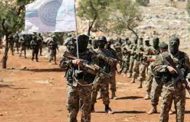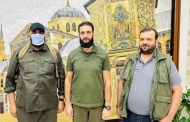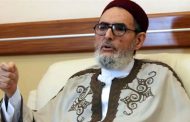Mohamed Fouad Hassan Hazzaa, known as Sharif Hazzaa, was born in Shebin El Kom, the Nile Delta province of Menoufia, in 1957. He was influenced by the Muslim Brotherhood’s ideology. He then turned to the Salafist ideology and traveled to Saudi Arabia to study Hadith (sayings of Prophet Muhammad) and Islamic law at the Islamic University in Medina. There, he attended the lectures of Sheikh Nasiruddin al-Albani who is a specialized in the study of Hadith.
He moved to Jordan where he worked as a book checker. After studying the science of Hadith, he checked some books by Ibn Taymiyyah, such as “The Great Compilation of Fatwa” and “The Friends of Allah and the Friends of Satan”. He also checked some books by Muhammad ash-Shawkani, such as “Antiques in the Doctrines of Predecessors”. He also wrote some religious books, such as “Excuse with Ignorance”.
Hazzaa returned home after his wife gave birth to their son, Moaz, on October 20, 1987. He then took the family and traveled to Pakistan where he obtained a Master’s Degree in Hadith and worked in teaching at the Institute of Jama’at al-Tawhid wal-Jihad in the city of Peshawar on the Afghan border. He met a number of leaders of armed groups in Afghanistan. Before his first year in Pakistan came to an end, Hazzaa returned to Egypt, but did not stay for long. He traveled to the United Arab Emirates and then to Indonesia where he studied Hadith at the Islamic Institute. In 1998, he returned to his hometown.
In August 1999, he was arrested and sent to military court in a case that came to be known later as the “Albania Returnees”. However, the court acquitted him. Then, an arrest warrant was issued him. He moved from one prison to another until he finally settled down in the Torah Prison.
Hazzaa played a tangible role in the success of the ideological revisions carried out by violent groups in the prisons. The revisions led to the renunciation of violence by the members of these groups.
Similarity between Hazzaa’s nickname and that of Abu Hamza al-Muhajir, the former leader of al-Qaeda in Iraq, confused the media which continues to mistake each of the two men for the other.
In the US, Hazzaa is mistaken for the leader of al-Qaeda in Iraq. US media claimed that Hazzaa died in 2010.
Nonetheless, Montasser al-Zayat, a well-known lawyer of Islamist movements, clarified the issue by proving that Hazzaa was being held at the Torah Prison in Egypt. Hazzaa’s wife also sent a written statement to the media in which she said her husband was in Torah and that he had never been to Iraq.
On the line of fire
Hazzaa was released from prison ahead of the 2011 revolution that ended the rule of autocrat Hosni Mubarak. In September 2012, he travelled to Istanbul, Turkey, and then to Syria.
He stayed in Aleppo at the beginning where he joined Fatah al-Sham, formerly al-Nusra Front. Fatah al-Sham then became Tahrir al-Sham – under the leadership of Abu Mohammad al-Julani – after a number of factions joined it.
Hazzaa was active in teaching Islamic law to the organization’s fighters. He then broke away with the organization after it attacked the 13th Brigade of the Free Syrian Army in March 2016. He viewed the attack as a violation of the rules of the Islamic religion. Hazzaa then worked as a legal judge for al-Ahrar Front.
In March 2017, Hazzaa unveiled secret negotiations between Julani and Iran. He said the negotiations took place in Qatar. He also launched a scathing attack on Julani for using force in unifying militant factions active in Syria.
When Ahrar al-Sham attacked al-Ahrar Front, Hazzaa said dead fighters on Julani’s side would go to hell, whereas dead fighters on Ahrar Al Sham’ side would go to heaven because they were not aggressors.








































admin in: How the Muslim Brotherhood betrayed Saudi Arabia?
Great article with insight ...
https://www.viagrapascherfr.com/achat-sildenafil-pfizer-tarif/ in: Cross-region cooperation between anti-terrorism agencies needed
Hello there, just became aware of your blog through Google, and found ...